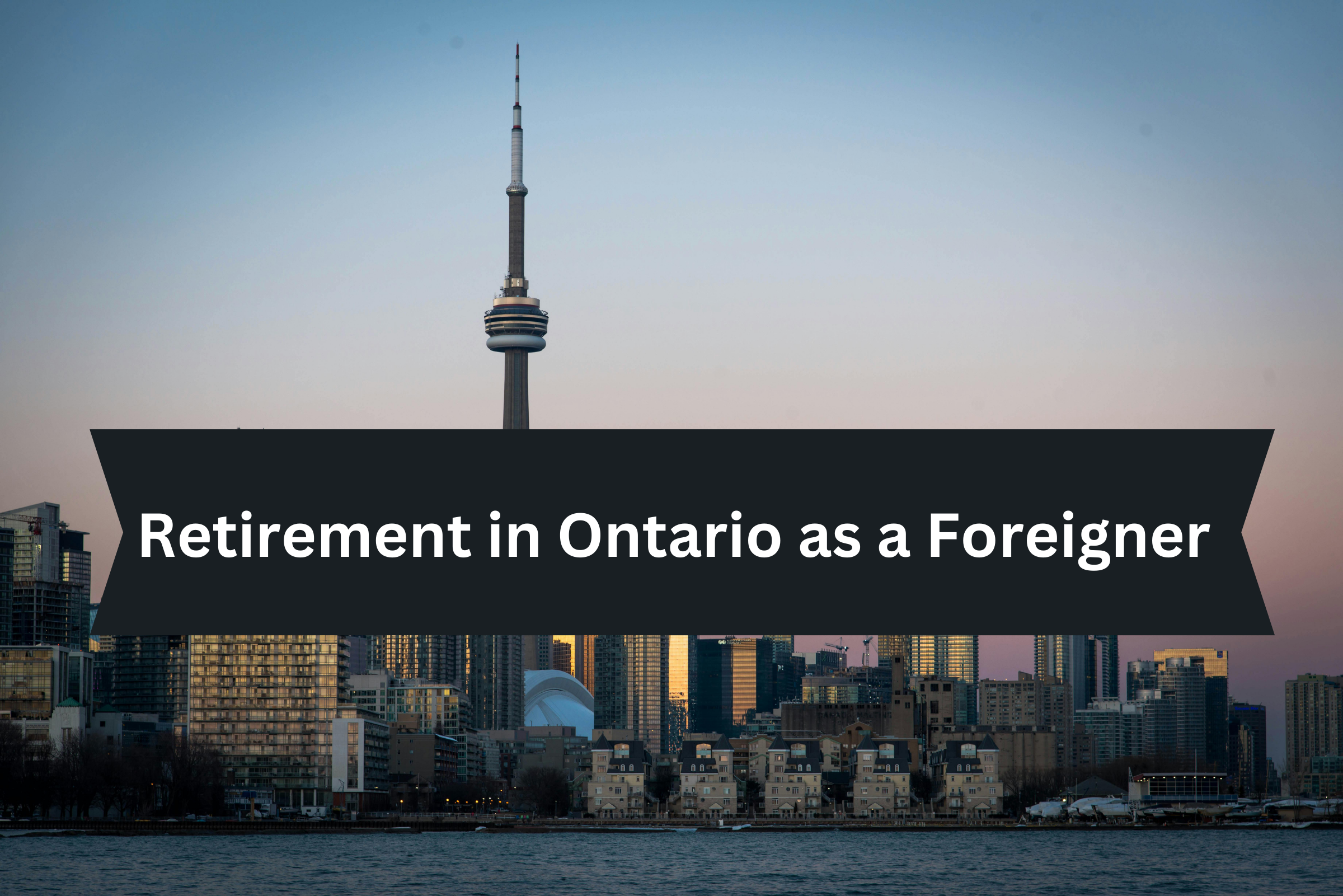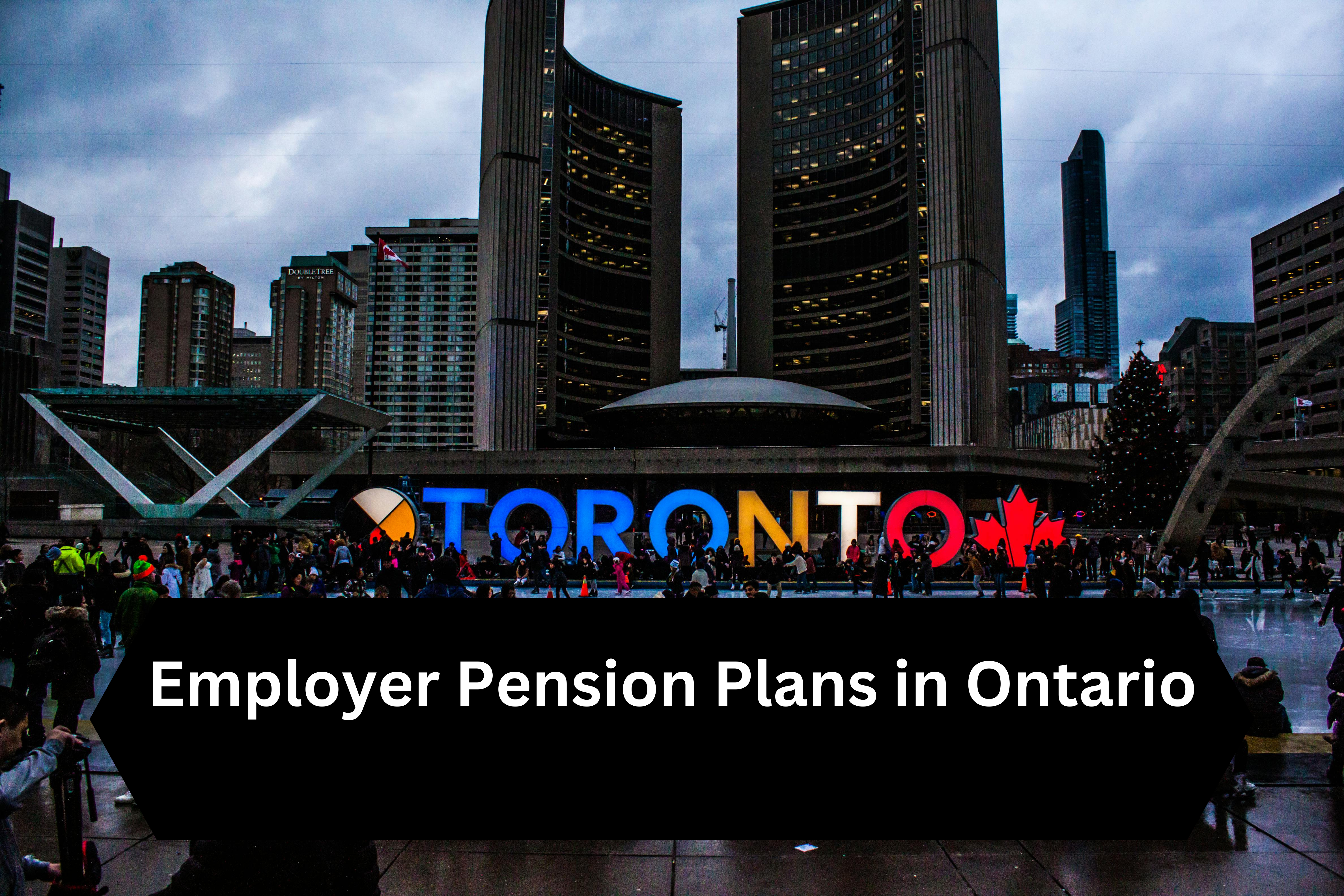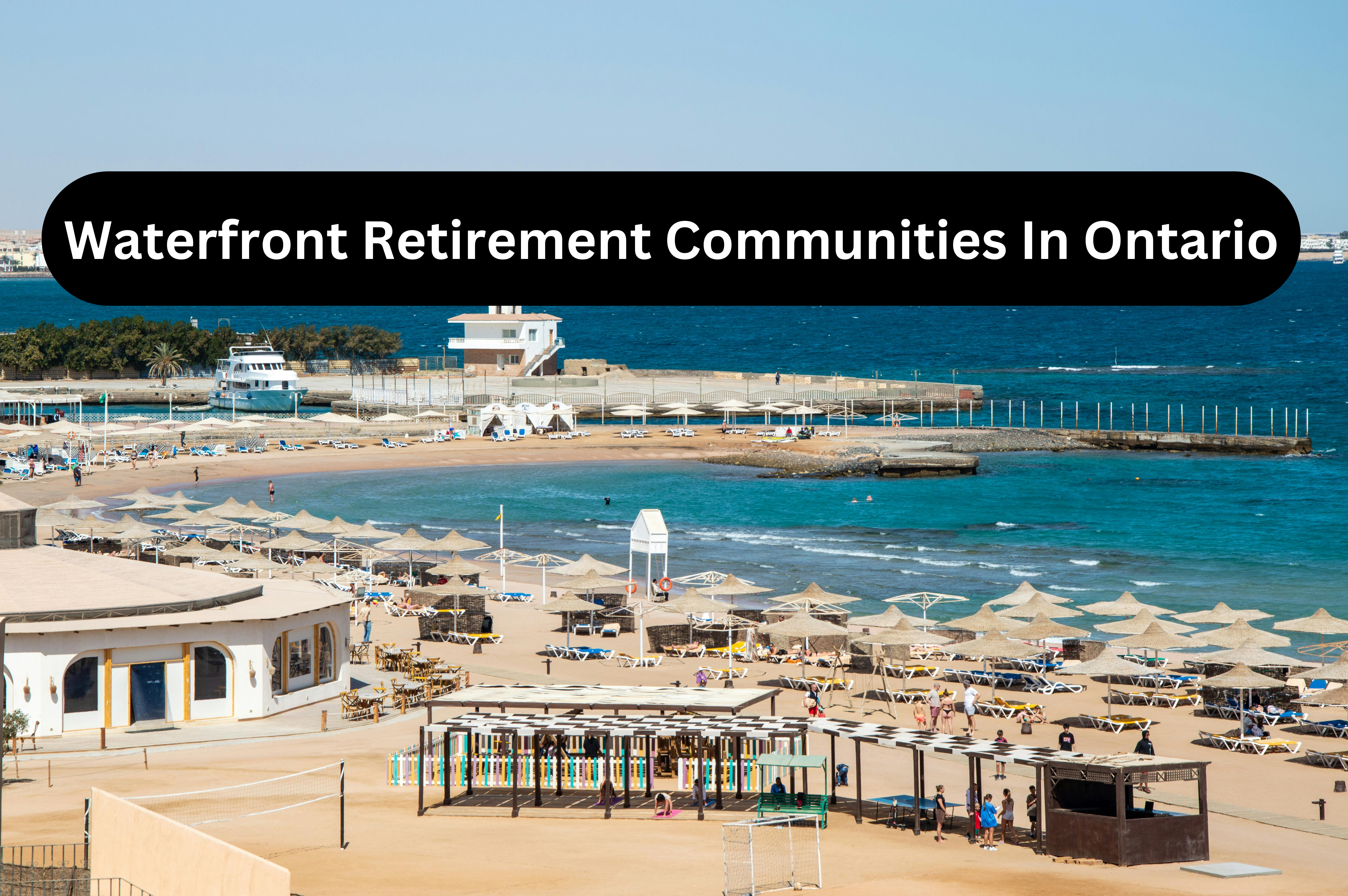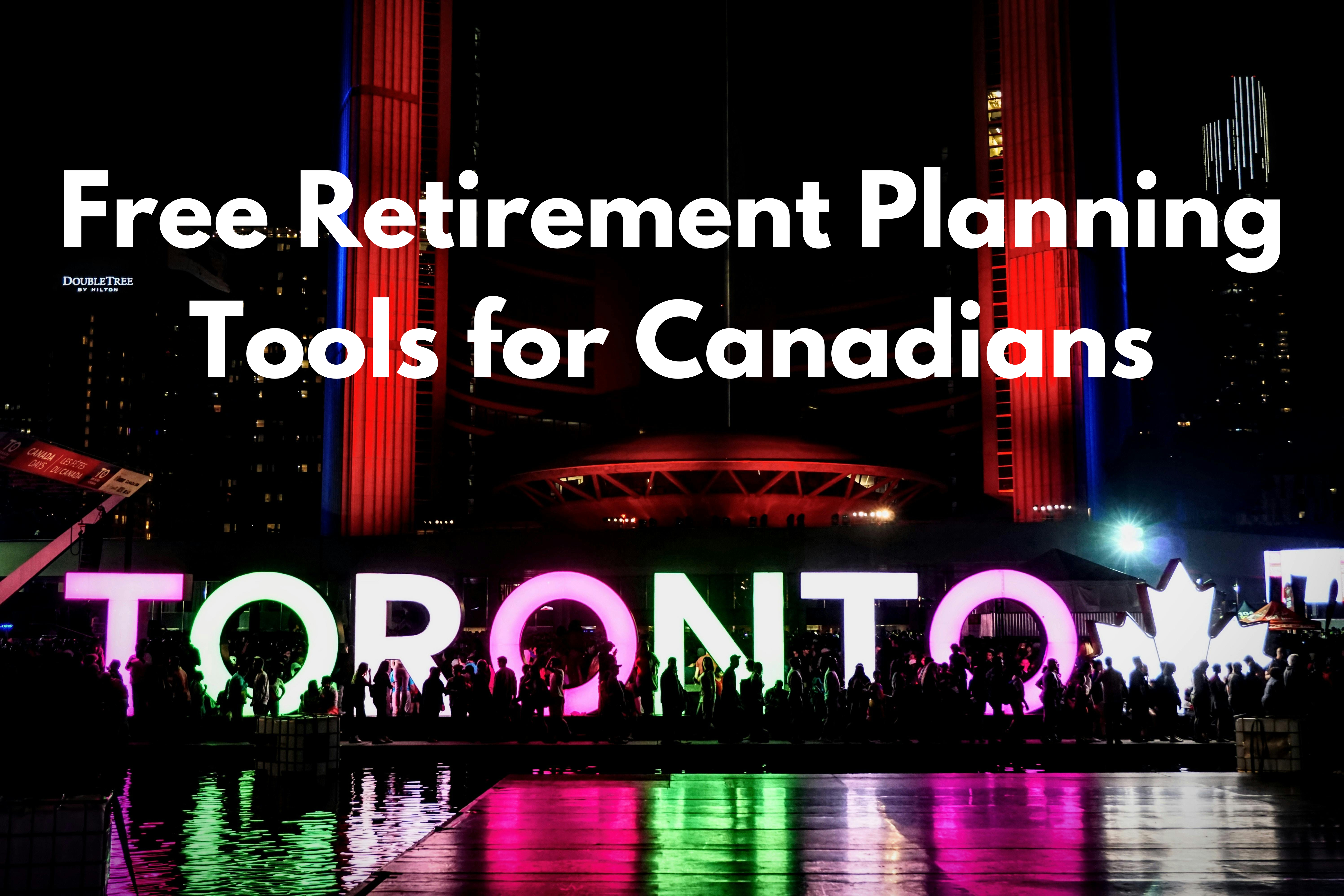How to Retire in Ontario as a Foreigner: A Complete Guide

Retiring in Ontario is a dream for many foreigners looking to enjoy quality of life, excellent healthcare, and a safe, welcoming environment. Whether you’re drawn to the vibrant city life of Toronto, the historic charm of Kingston, or the peaceful lakeside communities, Ontario offers a variety of options for retirees.
But how do you, as a foreigner, retire in Ontario? Do you need permanent residency? How much money do you need? What about healthcare access? If you’ve been asking these questions, you’re in the right place.
This guide covers everything you need to know about retiring in Ontario as a foreigner, including legal requirements, cost of living, healthcare options, the best places to settle, and financial planning tips.
Whether you're considering moving from the U.S., Europe, or anywhere else, this article will help you navigate the process and make informed decisions about your retirement in Canada’s most populous province.
Why Choose Ontario for Retirement?
- World-Class Healthcare: Ontario offers one of the best healthcare systems, with options for both public and private coverage.
- Diverse & Multicultural: No matter where you're from, you’ll find a welcoming community and cultural diversity in Ontario.
- Stable Economy & Safety: Canada is known for its strong economy, low crime rates, and high living standards.
- Plenty of Retirement-Friendly Cities: From bustling urban centers to peaceful countryside towns, Ontario has retirement options to suit every preference.
Who is This Guide For?
- Retirees considering moving to Ontario permanently or part-time.
- Foreigners interested in buying property or investing for retirement in Canada.
- Expats and non-residents exploring healthcare and financial planning options in Ontario.
- Anyone wondering if they can retire in Canada without being a citizen or resident.
Ready to learn more? Let’s dive into the details of how you can retire in Ontario as a foreigner!
Table of Contents
- Can Foreigners Retire in Ontario?
- How to Move to Ontario for Retirement
- Cost of Retiring in Ontario
- Healthcare for Retirees in Ontario
- Best Places to Retire in Ontario
- Best Cities for Retirees (For those who want convenience, healthcare access, and entertainment)
- Affordable Retirement Towns in Ontario (For retirees on a budget looking for lower-cost living)
- Best Small Towns for Quiet Retirement (For those seeking a peaceful, nature-filled lifestyle)
- Best Retirement Communities for Expats & Foreigners
- Financial Planning for Retirement in Ontario
- Buying or Renting Property as a Foreign Retiree in Ontario
- Frequently Asked Questions
Can Foreigners Retire in Ontario?
Yes, foreigners can retire in Ontario; however, Canada does not offer a specific retirement visa. To reside in Ontario long-term, foreign retirees must obtain permanent residency through existing immigration pathways.
Legal Requirements for Retiring in Canada as a Foreigner
Since there's no dedicated retirement visa, prospective retirees must explore alternative immigration options, such as:
Family Sponsorship: If you have close relatives who are Canadian citizens or permanent residents, they may be able to sponsor your application for permanent residency.
Economic Immigration Programs: Some individuals may qualify for programs like the Express Entry system or Provincial Nominee Programs (PNPs) based on their professional skills and experience. However, these are typically geared toward younger professionals and may not be suitable for all retirees.
Do You Need Canadian Citizenship or Permanent Residency?
To live in Ontario year-round, you must obtain permanent residency. Canadian citizenship is not mandatory for residency but offers additional rights, such as voting. Permanent residents can access public services, including healthcare, and reside in Canada indefinitely, provided they meet residency obligations.
Can You Retire in Ontario on a Visitor Visa?
Visitor visas are designed for temporary stays and typically allow visitors to remain in Canada for up to six months. While it's possible to spend part of your retirement in Ontario on a visitor visa, this approach has limitations:
Duration: Most visitors can stay for up to six months in Canada. If you're allowed to enter Canada, the border services officer may allow you to stay for less or more than six months.
Healthcare Access: Visitors do not have access to Canada's publicly funded healthcare system and would need to secure private health insurance.
Residency Perception: Repeatedly entering Canada on visitor visas with the intent to reside may raise concerns with border officials about your residency intentions.
How to Move to Ontario for Retirement
If you're a foreigner planning to retire in Ontario, you need to consider your immigration status, visa options, and residency requirements. Unlike some countries that offer dedicated retirement visas, Canada does not have a specific retirement visa program. However, there are several immigration pathways that may allow you to retire in Ontario legally.
A. Immigration Pathways for Retirees
1. Express Entry (For Those Still Working Before Retiring)
If you're close to retirement but still working, you might be eligible for Express Entry programs such as:
- Federal Skilled Worker Program (FSWP) – If you have work experience in an eligible occupation.
- Canadian Experience Class (CEC) – If you have prior work experience in Canada.
- Provincial Nominee Program (PNP) in Ontario – If you qualify for Ontario's targeted worker programs.
While Express Entry is typically for working professionals, obtaining Permanent Residency (PR) before retirement can be a long-term strategy to retire in Ontario.
2. Family Sponsorship (If You Have Children in Canada)
If you have adult children who are Canadian citizens or permanent residents, they can sponsor you for Parents and Grandparents Sponsorship (PGP). This pathway allows you to obtain PR and eventually qualify for government benefits like healthcare.
- Sponsorship requirements include financial proof that your child can support you.
- The application process involves submitting an Expression of Interest (EOI) and waiting for invitations.
Alternative: If you're not selected for PR sponsorship, you can apply for a Super Visa, which allows you to stay in Canada for up to 5 years at a time with multiple entries.
3. Investor & Business Immigration Options
If you have significant savings and want to invest in Canada, you might qualify for:
- Ontario Immigrant Nominee Program (OINP) Entrepreneur Stream – Requires investment in a business.
- Start-Up Visa – If you plan to start an innovative business in Ontario.
These options allow you to move to Ontario, gain PR, and transition into retirement while managing investments.
B. Can You Retire in Ontario Without Permanent Residency?
Yes, but it comes with limitations. If you don't have PR, you can retire in Ontario as a long-term visitor, but:
- You won't qualify for free healthcare (OHIP) and must get private insurance.
- You cannot work or receive pensions from Canada (unless you qualify through international agreements).
- You must leave every 6 months unless you obtain a Super Visa or another legal status.
Also read Top 10 Worst Places to Retire in Ontario
Best Option for Non-PR Retirees:
- Apply for a Super Visa for longer stays.
- Consider dual residency by living in Canada part-time and maintaining status elsewhere.
- Invest in property or business options that could lead to PR.
Sources: moving2canada.com ircc.canada.ca CanadaVisa
Also read Best places to retire in Ontario
Cost of Retiring in Ontario
Retiring in Ontario as a foreigner requires careful financial planning. Understanding the cost of living will help you determine how much money you need to retire comfortably. Here’s a breakdown of the key expenses:
Cost of Living Breakdown
The cost of living in Ontario varies depending on the city or town you choose, your lifestyle, and whether you own or rent your home.
1. Housing Costs (Buying vs. Renting)
Buying a Home:
- The average home price in Ontario varies by city:
- Toronto: $1,000,000+ (highly expensive)
- Ottawa: $600,000+ (more affordable)
- Smaller towns: $400,000+ (budget-friendly)
- Property taxes range from 0.5% to 1.5% of the home value annually.
- Foreign buyers may need to pay additional taxes, like the Non-Resident Speculation Tax (NRST) (if applicable).
- The average home price in Ontario varies by city:
Renting a Home:
- Toronto: One-bedroom apartment: $2,500+ per month
- Ottawa: One-bedroom apartment: $1,800+ per month
- Smaller towns: One-bedroom apartment: $1,200–$1,500 per month
2. Healthcare Costs for Non-Residents
- Permanent residents qualify for Ontario Health Insurance Plan (OHIP), which covers most medical services.
- Foreign retirees without PR status may need private health insurance, costing $1,500–$5,000 per year.
- Prescription drugs, dental care, and vision care often require additional coverage.
3. Food, Transportation, and Utilities
- Groceries: $300–$600 per month (per person, depending on eating habits).
- Public Transport:
- Monthly pass in Toronto: $156
- Smaller cities: $80–$120 per month
- Utilities (Electricity, Water, Heating, Internet):
- Apartment: $150–$300 per month
- House: $250–$500 per month
Healthcare for Retirees in Ontario
One of the biggest concerns for foreigners retiring in Ontario is access to healthcare. Canada is known for its universal healthcare system, but does it cover foreign retirees? Let's break it down:
Is Healthcare Free for Foreign Retirees?
Canada's healthcare system is publicly funded, meaning that residents don’t have to pay out-of-pocket for most medical services. However, healthcare in Ontario is not automatically free for foreign retirees. It depends on your residency status and eligibility for Ontario’s health insurance plan (OHIP).
Ontario Health Insurance Plan (OHIP) Eligibility
OHIP covers essential healthcare services like doctor visits, hospital stays, and emergency care, but you must meet residency requirements to qualify.
Who is Eligible for OHIP?
To qualify, you must:
✅ Be a Canadian citizen, permanent resident, or certain work permit holders
✅ Physically live in Ontario for at least 153 days per year
✅ Have a valid Ontario address
Who is NOT Eligible?
❌ Foreigners on visitor visas (including retirees without PR)
❌ New immigrants within their first 3 months in Ontario (waiting period applies)
❌ Retirees who spend less than 153 days per year in Ontario
Private Health Insurance Options for Foreign Retirees
If you are not eligible for OHIP, you will need private health insurance to cover medical expenses. Some options include:
- Expat & International Health Insurance Plans (e.g., Cigna, Allianz, Manulife)
- Canadian Private Insurance Providers (e.g., Sun Life, Blue Cross)
- Travel Insurance with Extended Medical Coverage
💡 Tip: Buy private insurance before arriving in Canada to ensure you're covered from day one.
Healthcare Costs for Non-Residents
If you don't qualify for OHIP, you must pay out-of-pocket for healthcare services, which can be expensive. Here’s a rough idea of healthcare costs in Ontario without insurance:
| Medical Service | Estimated Cost (CAD) |
|---|---|
| Doctor’s Visit | $100 - $200 |
| Emergency Room Visit | $500 - $1,500 |
| Hospital Stay (per night) | $3,000 - $4,000 |
| Specialist Consultation | $250 - $500 |
| Prescription Medications | Varies (covered by private insurance) |
Long-Term Care & Assisted Living for Retirees
- Ontario offers long-term care homes and senior assisted living services, but access is limited for non-residents.
- Private retirement homes are available, but they can be costly ($2,500 - $6,000/month).
- Home care services are an option for those who prefer to stay independent.
Best Places to Retire in Ontario
Ontario offers a variety of cities and towns suited for retirees, whether you’re looking for an urban lifestyle, lakeside tranquility, or affordability. Below are some of the best places to retire in Ontario, categorized by different preferences.
Best Cities for Retirees (For those who want convenience, healthcare access, and entertainment)
1. Toronto
✅ Pros:
- World-class healthcare facilities (e.g., Toronto General Hospital)
- Multicultural community with diverse food and entertainment
- Plenty of senior activities, cultural events, and parks
❌ Cons:
- High cost of living, especially housing and property taxes
- Busy and crowded, which may not suit all retirees
2. Ottawa (Best for retirees who love history, culture, and a slower pace than Toronto)
✅ Pros:
- Affordable compared to Toronto
- Excellent public healthcare services and facilities
- Scenic and peaceful, with access to the Rideau Canal
❌ Cons:
- Cold winters with heavy snowfall
- Limited entertainment compared to Toronto
3. London, Ontario (Great for affordability and access to healthcare)
✅ Pros:
- One of the most affordable mid-sized cities in Ontario
- Home to St. Joseph’s Healthcare, offering excellent senior care
- Smaller city feel with urban conveniences
❌ Cons:
- Fewer public transportation options
- Less diverse entertainment scene
Affordable Retirement Towns in Ontario (For retirees on a budget looking for lower-cost living)
4. Kingston
✅ Pros:
- Lower cost of living than major cities
- Home to excellent hospitals (Kingston General Hospital)
- Beautiful waterfront and historic sites
❌ Cons:
- Colder winters
- Smaller job market for part-time retirees
5. Peterborough
✅ Pros:
- Affordable housing compared to major cities
- Close to the Kawartha Lakes for outdoor activities
- Good access to healthcare
❌ Cons:
- Less entertainment compared to cities
- May require a car for daily errands
Best Small Towns for Quiet Retirement (For those seeking a peaceful, nature-filled lifestyle)
6. Cobourg
✅ Pros:
- Beautiful lakeside town with sandy beaches
- Quiet and peaceful, great for nature lovers
- Strong senior community and support services
❌ Cons:
- Fewer public transport options
- Some healthcare services may require travel to larger cities
7. Stratford
✅ Pros:
- Famous for its Stratford Festival (theatre & arts scene)
- Small-town feel with cultural attractions
- Affordable housing and low crime rates
❌ Cons:
- May not suit those who prefer a more active city lifestyle
- Can be quiet in the off-season
Best Retirement Communities for Expats & Foreigners
- Niagara-on-the-Lake – A charming wine country town with great healthcare access.
- Wasaga Beach – Known for its beautiful sandy beaches and relaxed retirement communities.
- Orillia – A lakeside town offering boating, fishing, and senior-friendly living.
- Collingwood – A perfect spot for retirees who enjoy skiing and the outdoors
Financial Planning for Retirement in Ontario
Retiring in Ontario as a foreigner requires careful financial planning to ensure a comfortable and stress-free lifestyle. Below are key financial aspects to consider:
Do Foreigners Get a Pension in Canada?
Foreigners may be eligible for some Canadian pension benefits, but it depends on their residency status and work history in Canada.
- Old Age Security (OAS): Available to Canadian citizens and permanent residents who have lived in Canada for at least 10 years after turning 18. If you have lived in Canada for less than 10 years, you may still qualify if your home country has a Social Security Agreement with Canada.
- Canada Pension Plan (CPP): You can receive CPP if you have contributed to it while working in Canada. Contributions are mandatory for most employees.
- International Pension Agreements: Canada has agreements with several countries, allowing retirees to receive pension benefits from both countries.
💡 Tip: If you do not qualify for government pensions, you will need private retirement savings or other income sources.
Managing Retirement Savings & Investments
As a foreign retiree, you need to plan how to manage your retirement savings effectively.
- Registered Retirement Savings Plan (RRSP): If you previously worked in Canada, you might have an RRSP, which provides tax advantages for retirement savings.
- Tax-Free Savings Account (TFSA): A TFSA allows tax-free investment growth, making it a great option for retirement savings.
- Offshore Savings & Investments: If you have assets in another country, ensure you understand the tax implications when transferring money to Canada.
- Annuities & Investment Portfolios: Consider working with a Canadian financial advisor to ensure your savings provide steady retirement income.
Taxation for Foreign Retirees in Canada
Understanding tax obligations is crucial for financial planning.
- Do Foreign Retirees Pay Taxes in Canada?
- If you are a Canadian resident for tax purposes, you must report worldwide income.
- If you remain a non-resident, only your Canadian-sourced income is taxable.
- Withholding Taxes on Foreign Pensions: Some foreign pensions may be subject to Canadian taxes unless a tax treaty applies.
- Tax Benefits for Seniors:
- Age Credit (for those 65+)
- Pension Income Credit
- Medical Expense Deductions
💡 Tip: Work with a tax consultant to minimize your tax liability and take advantage of any available tax credits.
Banking and Transferring Money from Abroad
Setting up your finances in Canada is essential for managing retirement expenses.
- Opening a Canadian Bank Account:
- Many banks offer accounts for newcomers and foreign retirees.
- Options include RBC, TD, Scotiabank, CIBC, and BMO.
- Transferring Money to Canada:
- Use international money transfer services like Wise, OFX, or direct bank transfers.
- Be mindful of exchange rates and transfer fees.
- Currency Exchange Considerations:
- If your pension or income is in a different currency, consider exchange rate fluctuations when planning your budget.
💰 Final Tip: A solid financial plan ensures a stress-free retirement in Ontario. Consider working with a Canadian financial advisor for investments, taxes, and pension eligibility advice.
Buying or Renting Property as a Foreign Retiree in Ontario
One of the biggest decisions when retiring in Ontario as a foreigner is whether to buy or rent a home. This section covers everything you need to know about real estate laws, housing costs, and the best retirement communities for foreign retirees.
Can Foreigners Buy Property in Ontario?
Yes, foreigners can buy property in Ontario, but there are some restrictions and additional costs to consider:
- New Foreign Buyer Ban (2023-2025): The Canadian government has banned non-residents from purchasing residential properties until 2025. However, some exemptions exist, such as buying multi-unit buildings or if you are a permanent resident.
- Non-Resident Speculation Tax (NRST): Foreign buyers must pay a 25% tax on home purchases in the Greater Golden Horseshoe area, including Toronto, Hamilton, and Niagara.
- Mortgage Rules for Foreigners: Most banks require a 35%+ down payment for non-residents and proof of income/assets.
Renting vs. Buying: What’s the Best Option?
✅ Renting Pros & Cons
✔ More flexible, no property tax
✔ No maintenance costs
❌ Rent prices can increase over time
❌ No home equity
✅ Buying Pros & Cons
✔ Long-term investment
✔ Stability & ownership
❌ Large upfront costs (down payment, taxes)
❌ Maintenance & property taxes
Steps to Buy a Home as a Foreign Retiree
- Check Eligibility – Ensure you qualify under current foreign buyer rules.
- Hire a Real Estate Agent – Helps navigate property laws and find suitable homes.
- Secure Financing – If getting a mortgage, be prepared for a 35-50% down payment.
- Pay the Required Taxes – Include land transfer tax and speculation tax if applicable.
- Finalize Purchase – Work with a lawyer to close the deal.
Alternatives: Retirement Homes & Assisted Living
If home ownership isn’t ideal, consider retirement communities or assisted living facilities:
- Independent Living – Private apartments with senior-friendly services.
- Assisted Living – Extra support for medical and daily needs.
- Long-Term Care Homes – For those needing full-time medical care.
Challenges & Solutions for Retiring in Ontario as a Foreigner
Language Barriers & Cultural Differences
- Challenge: Ontario, particularly cities like Toronto, is incredibly diverse, but English (and French in some regions) is the primary language. For retirees not fluent in English or French, this could pose a challenge in day-to-day communication and integration into the community.
- Solution: There are many language programs available for newcomers to Canada. The government offers free language training through Language Instruction for Newcomers to Canada (LINC). Additionally, various cultural integration workshops and community centers are available to help ease the transition.
Access to Support Services for Seniors
- Challenge: Foreign retirees may face difficulties in accessing healthcare and other social services, especially if they do not qualify for the Ontario Health Insurance Plan (OHIP) right away.
- Solution: Private health insurance plans can cover your immediate healthcare needs. Once eligible, you can apply for OHIP, and provincial programs like Seniors' Health and Wellness Services can help with aging-related care. It's important to familiarize yourself with provincial and municipal services for seniors.
Legal & Financial Challenges
- Challenge: Navigating the Canadian legal and financial systems can be daunting for foreign retirees, especially regarding tax laws, pensions, and estate planning.
- Solution: Consulting a financial advisor who specializes in cross-border tax laws and retirement planning for foreigners is highly recommended. You’ll also need to familiarize yourself with Canada’s tax treaties and how foreign pensions are taxed in Ontario. Hiring an immigration lawyer could help guide you through the paperwork for permanent residency applications.
Frequently Asked Questions
Can I Get a Retirement Visa for Canada?
Canada does not have a specific “retirement visa.” However, retirees can apply for permanent residency through various immigration pathways such as the Express Entry system, if you have the financial means to support yourself, or through other programs like Family Sponsorship. Some retirees also qualify through investment immigration options.
How Do I Get Permanent Residency as a Retiree?
To qualify for permanent residency, you’ll need to meet certain criteria based on your situation. Common pathways include family sponsorship (if you have Canadian relatives), or through investment and business immigration programs where you invest a certain amount of capital into the economy. Consult with an immigration lawyer or consultant to understand the best route based on your specific circumstances.
What Happens If I Need Long-Term Care in Ontario?
Long-term care services in Ontario are available for seniors, but accessing them can be complicated for foreign retirees. If you are a permanent resident or citizen, you will have access to these services through OHIP. However, if you are a foreign retiree without permanent residency, you might need to rely on private insurance or pay out-of-pocket until you qualify for OHIP coverage. It's essential to plan for this scenario in advance.
Can I Work Part-Time While Retired in Canada?
Yes, retirees can work part-time in Canada. However, your work options might be limited depending on your immigration status. As a permanent resident or citizen, you are free to work without restrictions. Foreign retirees who are not residents or citizens may need a work permit, which typically requires a job offer from an employer.
What Are the Best Retirement Communities for Expats in Ontario?
Ontario has several communities that are popular among retirees, including areas like Toronto, Ottawa, Niagara Falls, and smaller towns such as Collingwood and Stratford. Expats often prefer regions that are multicultural and have well-developed amenities for seniors. Researching specific retirement communities that cater to expats or English-speaking seniors can help you find a suitable place to settle.
Sources: moving2canada.com ircc.canada.ca CanadaVisa



